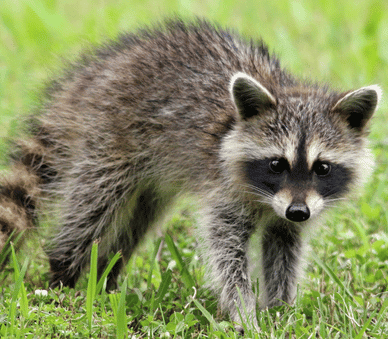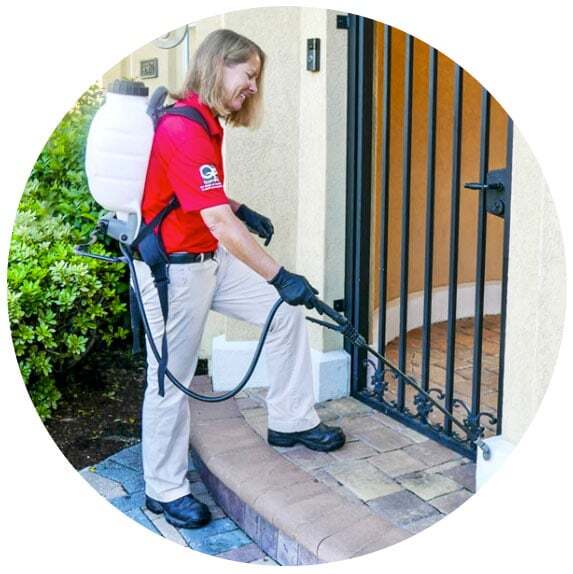We remove wildlife that found its way into your home or business as well as seal and eliminate entry points around the home.
Here’s how you can benefit from our no-nonsense wildlife removal and exclusion services.
Free, No Obligation Quote
Contact us and let us know about your wildlife pest control problem. We’ll give you a free quote for our complete and effective program.
Flexible Solutions
No two problems involving wildlife are the same—and so we’ll create solutions specifically tailored to your challenges.
Expert Technician Team
Our team knows wildlife habits, including where they’ll build nests and breed. We also know how to safely remove them from your home.
Personalized Plans
After inspecting your home, we’ll share our customized recommendation for you and answer your questions.

Turner provides wildlife exclusion and removal plus pest control services for creatures that commonly find their way into homes in Florida.
Rodents are highly destructive and can cause substantial damage if they enter your structure. Our trained technicians can expertly identify, seal and eliminate any common entry points around the exterior of the home, including the roof, gable or soffit vents, chimneys, crawlspaces and more, that would allow animals into the structure.
Racoons spread diseases that can harm you, your family, and your pets—and are actually one of the most common rabies carriers. Plus, raccoons damage homes. They can tear up soffits and roof shingles; destroy vents in your attic; and chew through attic insulation among other things. Contact us for rapid raccoon removal.
These rodents have habits that are similar to rats and mice and also spread unwanted diseases. Our squirrel trappers will stop them in their tracks before they have time to do more damage to your siding, insulation, cables, wires, and more. Their gnawing on wires can even lead to house fires, so contact us ASAP to remove squirrels.
These outdoor pests dig tunnels in your yard to find food and create places to breed. The result: serious lawn damage. Plus, just like raccoons and squirrels, they can carry serious disease that can spread to your family. If you suspect or know that this pest is on your property, contact us for armadillo removal services.
Bats can spread disease in multiple ways, including by transmitting it through droppings and urine. Their waste can cause serious damage to your home, too, leaking through drywall, ruining insulation, and damaging ceilings. If you have reason to believe you have a bat presence, contact us immediately for professional bat removal services.
Contact Turner Pest Control for premier wildlife removal services.
Turner makes it straightforward to tackle the presence of wild animals in your home.



When animals feel cornered, they can lash out to protect themselves and, without the proper tools, equipment, and training, DIY removal can lead to injury and illness. There are even legal issues connected with removing wild animals, laws that can be tricky to navigate. So, it just makes sense to reach out for professional wildlife removal services.
Our trained technicians will inspect your home, identify the critters and where they’re hiding and breeding, and create a customized plan to safely remove them from your home as well as seal openings that allow them to get inside of your structure. Our wild animal control services are fast, effective, and affordable. From raccoons and armadillos to squirrels and bats, we’ve got the expertise you need to exclude and remove them from your home.
To survive, animals need three key elements: food, water, and shelter. Instinct drives them to seek these out. Unfortunately for many homeowners, that instinct leads some animals to enter houses, especially crawl spaces or basements, attics, and walls. These places appeal to pests because they’re warm, dry, and protect them from inclement weather. In some cases, it may even provide them with food. While great for animals, it can create hassles and even health issues or property damage for homeowners and their families. This leads many homeowners to search for nuisance wildlife removal.
According to the Florida Fish and Wildlife Conservation Commission, nuisance wildlife is any animal that is:
If you have a pest on your property that meets any or all of the above criteria for nuisance wildlife, then wildlife removal services are necessary. Before you reach that point, though, there are some steps you can take to prevent wildlife from entering your yard or home.
To keep unwanted animals out of your yard, you’ll first have to remove anything that might attract them. That means anything that could provide them with a place to live or food. For example, many animals like to make their homes in dark, damp, cool places. They may find such places in wood piles, overgrown gardens, or yard waste. Removing this debris and maintaining your garden can deter wildlife from moving in. Filling empty burrows or holes in your yard with gravel will make it more difficult for animals who live underground to move into your yard. Watering your lawn less will have the same effect, as it makes it harder for burrowing animals to dig through.
Keeping food out of your yard will also stop it from attracting animals. If you grow any edible plants in your garden, make sure to harvest them as soon as they’re ripe so pests can’t get a hold of them. If you have any pets, avoid leaving their food outside overnight. Or, if you have any bird feeders hanging in your yard, remove them. Some animals, such as raccoons and opossums, are attracted to pet food and bird seed. Lastly, keep any trash cans you leave outside locked. Some animals dig through trash looking for food.
Not only should you remove means of survival when attempting to protect your yard from critters, but you should also repel the animals as well. One way to do so is to let any dogs you have run around your yard. They will scare many creatures off. Devices that make noise, such as wind chimes or pinwheels, can also scare them. Motion-sensor lights can do the same. As for natural repellents, you can grow certain plants in your yard that ward off unwanted pests. Such plants include lavender, bay laurel, wormwood, and narcissus. If you choose to use repellant plants and you have pets, please check which options are pet safe.
Should you continue to have issues with pests in your yard, particularly moles and armadillos, you may resort to hiring a wildlife removal service company like Turner Pest Control to put bait in burrows or apply products to your yard to keep these critters away. Taking any or all of these steps can lower your odds of an unwanted creature entering your home.
To keep animals out of your crawl space, you should seal it and prevent moisture from entering. First and foremost, you’ll want to check for any damage to your home where critters might enter. For example, you may find cracks or holes in the siding or foundation. Patching these damages as soon as possible will prevent pests from entering your home.
Putting in concrete floors and walls will also keep animals like armadillos and opossums from burrowing, or digging holes, into your crawl space. You should lay down plastic or foil sheets as well to prevent the moisture under your house that attracts many pests and to decrease the odds of cracks in your crawl space’s concrete.
Another way to keep nuisance wildlife at bay is to avoid planting shrubs or bushes along the side of your house. While they may be aesthetically pleasing, they can easily become places for unwanted animals to live, bringing them even closer to your home. Plus, such plants can turn the ground around your home softer and damper than it would be otherwise, which can make it easier for burrowing animals especially to enter your home.
Like when keeping animals out of your crawl space, your first step when keeping animals out of your attic is to check your home for any holes or cracks where they could enter. If you spot any damage, get it fixed as soon as possible. Animals may also enter your home via a chimney or vents in your roof. Installing vent covers and a chimney cap can stop them from doing so.
From there, you should cut down any branches or trees that hang over your roof. Ideally, you shouldn’t have trees within 20 feet of your home, although this number may be larger depending on the type of tree. Removing overhanging branches or trees will keep some animals off your roof and away from your attic.
If you previously had animals in your house and want to keep more from entering, companies that remove animals from your attic have an exclusion process to help. For example, the technicians at Turner Pest Control identify and seal the common entry points in the exterior of your home, such as vents, gables, and chimneys once they remove the animals already in your attic. The exclusion process will lower the possibility of animal habitation in your home in the future.
There are many types of animals that may move into your walls. Here are some of the common ones in Florida with helpful signs to determine which is living in your home:
While you should look out for all these signs when trying to determine which animal has taken up residence with you, you should call an animal removal company or someone with a wildlife removal certification to confirm the species and take the appropriate actions to remove it.
Squirrels and any other animal that get into your home pose a threat for a number of reasons. One reason is that they can cause serious damage to your house, like:
Animals, their droppings, and the parasites they carry also pose health risks to you, your family, and your pets. For one, they may carry diseases such as:
It can even lead to death if not treated. The latter is a disease with many of the same symptoms as HPS. Other symptoms include:
You can contract both of these diseases by coming into contact with rodents or their droppings.
Immediate critter removal from your attic, crawl space, basement, or walls is essential to protecting the health of everyone in your household.
If you discover animals that live in your house uninvited, you must take immediate action before they can reproduce or die. If you wait too long, you put your house at a higher risk for damage and expose your family to malodorous living conditions and even disease. While your first instinct may be to try to scare the animal out of your house or to catch it yourself, don’t do that. You may hurt yourself or the animal. Plus, local governing bodies like the Florida Wildlife Commission require you to have a permit to handle or remove wildlife.
Instead of scaring or catching the animal, your first step should be to put some distance between you and the animal. If possible while maintaining safety, keep an eye on it so that you know where in the house it is. Try to snap a few pictures of it as well so that pest control knows what it looks like and how big it is. Make sure that your phone is on silent and that you don’t use flash so that you don’t provoke the animal. Taking pictures of any damage the animal might have caused or its entry points will also give the professionals a better idea of how the animal gets in and out as well as how long it might have been living in your house.
From there, call a pest control company that can handle nuisance wildlife specifically, or call your landlord if you do not own the home. Your landlord should then call pest control for you. The trained professionals from these companies can expertly trap or bait animals to remove them from your home.
Squirrels and other animals that take up residence in your home typically will not leave after they have moved in as long as they feel safe and comfortable there. Your home is dry, warm, and dark, so it makes the perfect home for many kinds of wildlife. Some of these animals may leave during parts of the day to look for food, but they usually come back for shelter.
One exception might be for nesting animals. Nesting animals are those about to reproduce and have the instinct to create a nest or other home of some sort for their young. Once these animals reproduce and their offspring are old enough to move on their own, these families may leave. However, if the animals are causing damage or other harm, it’s best to get them out as soon as possible.
Sometimes disrupting the animals’ comfort can be enough to make them leave. For example, playing loud music near where they’re living or putting bright lights in their spaces can drive them out. Even strong-smelling substances, such as apple cider vinegar, can be enough to drive them away. However, calling professionals to remove the pests from your house can be a quicker, safer option. Some companies may even block off holes or other openings where the pests entered so that it’s harder for them to get back in.
It is important to note that it’s a common misconception that you should call animal control if you find a nuisance animal in your house or on your property. Unfortunately, animal control cannot help much in those situations.
Your local animal control typically focuses on care and safety related to dogs, cats, and livestock. For example, they work to control the dog and cat populations by encouraging the sterilization of pets. They may also put stray animals in temporary shelters for care and hopefully adoption. If you notice any animal abuse or neglect in your area, you can call animal control for that, too. They will conduct an investigation to discover the extent of abuse or neglect and may file charges or even take the animal away if they find it necessary.
You should call animal control in cases of domestic animal aggression as well. They will investigate how aggressive an animal truly is and determine what next steps they should take to protect the community. If an animal bites someone or is bitten by another animal, animal control will look into it to make sure the pet does not have rabies.
If your problem is not with a domestic animal but with wildlife, you’ll need to call a pest control company like Turner Pest Control instead.
If an animal invades and inhabits your home, call Turner Pest Control to remove it. We are your friendly, neighborhood pest control company in Florida. When you call us, you receive flexible solutions to best fit your situation. How do our professionals get rid of squirrels and other pests?
We start with a free quote based on your problem. Our trained technicians will come to your house and walk around the property, check the common places where the animal might have entered, and where the animal is living. Once we have a good understanding of the situation, we will create a customized plan for you to get critters out of your home before they can cause any more damage. From there, the technicians will use traps, baits, or sprays to remove the animal from your home. The wildlife removal cost will vary because each plan is so personalized. We also offer exclusion services so that those animals’ entry points are sealed.
First, if animals have gotten into your home, contact professional wildlife removal experts for safe and effective services. Doing so DIY can lead to injury and illness. If lawn pests are causing problems outdoors, you can call in experts that offer this type of wildlife pest control (such as armadillo removal).
Also examine your home to see where creatures may be entering, such soffit returns, vents, and so forth. Seal them up to prevent future wildlife presence. While doing this, consider sealing up small cracks and crevices where rats, mice, and other pests can enter your home.
We use trained squirrel trappers to remove squirrels safely and effectively from your home. This kind of mammal is often found around Florida homes, and they may find their way inside of your attic (or, if you have one, a basement). They can then travel through your walls. So, contact us for squirrel removal services once you recognize a problem.
If they’re outdoors, motion-activated lights may cause them to go elsewhere. To further discourage them, make sure any outdoor trash is very tightly sealed (they’re crafty creatures); there are actually trash bags that come with raccoon repellents (smells that they don’t like). Don’t leave pet bowls with food or water outdoors except when your pet needs them; this can include bird feeders. Trim trees and other landscaping close to your home to remove an on-ramp to your roof. Have your lawn treated for grubs, which eliminates yet another food source for them. Then, if they get inside your home, reach out for professional raccoon removal services.
First, we’re the experienced choice with fifty years of helping families with pest infestations. We provide a personalized approach to wildlife pest control, focusing specifically on your unique problem. We’re fully committed to your satisfaction. Plus, we offer lawn and outdoor pest control services where, as an add-on, we can take care of armadillo removal needs. As part of our lawn services, we’ll take care of any grubs that can serve as food for raccoons, making your property less attractive to those raccoons.
Plus, we know that, when you have wildlife problems, you want them taken care of as quickly as possible. That’s why we’ve created a specific inbox where you can quickly and conveniently let us know that you need help. So, don’t delay. Contact our experts today.
Still have questions? See all Frequently Asked Questions
Get More Answers
Ready for expert pest control? Find a Turner Pest Control location near you.